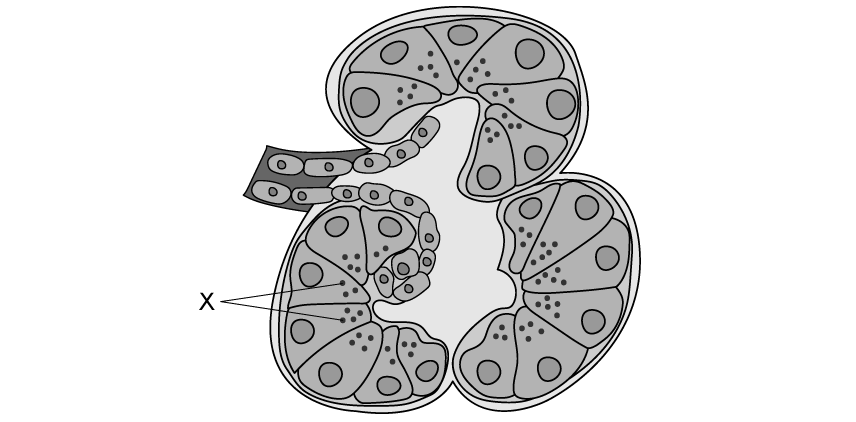Question 1
The diagram shows a representation of the human digestive system.

Which of the labelled organs are involved with the digestion of lipids?
J and L.
I, J, and L.
I and J.
L and K.
The diagram shows a representation of the human digestive system.

Which of the labelled organs are involved with the digestion of lipids?
J and L.
I, J, and L.
I and J.
L and K.
The diagram shows part of the pancreas.

What are the structures labelled X?
Acinar cells
Islets of Langerhans
Duct cells
Secretory vesicles
Which row correctly identifies the role of each enzyme?
| A. | Amylase digests starch into maltose | Dipeptidase digests dipeptides into amino acids | Phospholipase digests phospholipids into fatty acids and glycerol |
| B. | Amylase digests starch into maltase | Dipeptidase digests longer polypeptides into shorter polypeptides | Lipase digests triglycerides into fatty acids and glycerol |
| C. | Amylase digests starch into glucose | Protease digests longer polypeptides into shorter polypeptides | Phospholipase digests phospholipids into fatty acids, glycerol, and phosphate |
| D. | Amylase digests starch into maltose | Dipeptidase digests dipeptides into amino acids | Lipase digests triglycerides into fatty acids and glycerol |
Which of the statements about villi is correct?
The cell surface membranes on the capillary side of the villus epithelium are folded into microvilli.
The cell surface membranes on the capillary side of the villus epithelium have transport proteins in their cell surface membranes.
Villi epithelium contains goblet cells for the secretion of surfactant.
The useful products of digestion are all moved into the cells of the villi epithelium down their concentration gradient.
Which of the following statements about the absorption of nutrients are correct?
I. Nutrients pass from the small intestine lumen to the blood via epithelium cells.
II. Triglycerides enter the capillaries by exocytosis.
III. Glucose uses facilitated diffusion, active transport, co-transport, and simple diffusion to enter the capillaries.
I only.
I and II only.
I, II, and III.
II and III only.